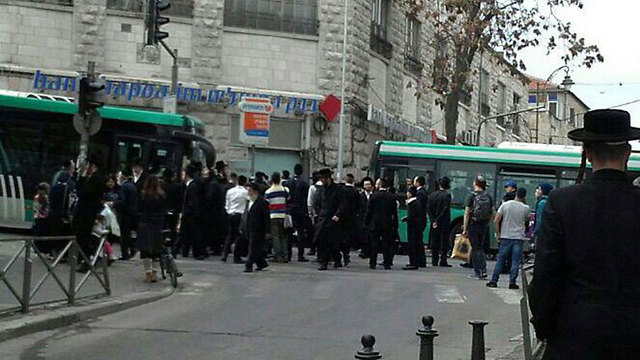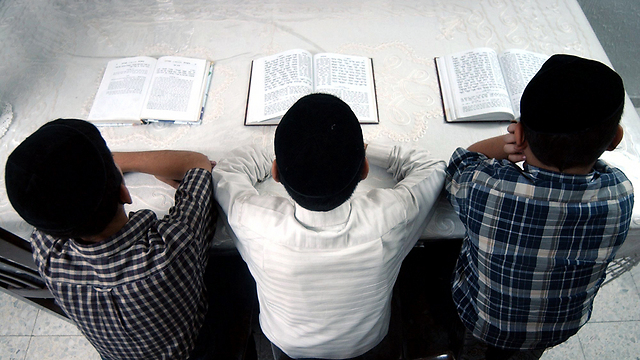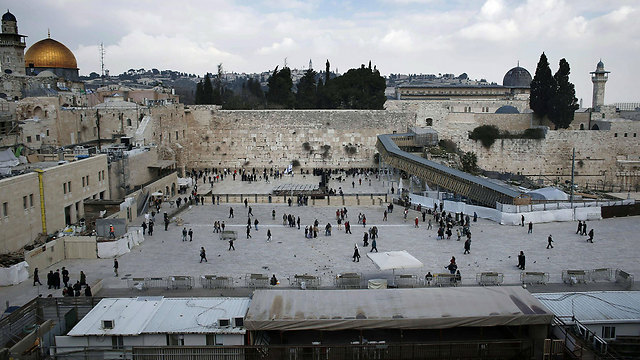Op-ed: While the ultra-Orthodox public is intentionally ignorant about general matters, the secular public seems to be choosing its own brand of ignorance when it comes to matters of Judaism. That has to end if we are to decide what it means for us to be a Jewish nation.
Three weeks ago, I met with an ultra-Orthodox journalist of the same age as me in Beit Shemesh. By the grace of god, we ended up meeting on a day of rage. Demonstrators were walking the streets and setting fire to garbage cans, protesting the decision to perform an autopsy on the mayor’s deceased grandson. They think it’s wrong.
The protesters are part of a fringe group in ultra-Orthodox society, and my partner in conversation is a member of a well-known Hassidic group. He’s a smart man, educated, and most of all – very surprising. I expected to meet a person with attributes familiar to me from my usual contact with ultra-Orthodox people, but what I was faced with was someone who knows my world. We spoke about books by Haim Be’er, Zionism, and modernization.

Do you know why our people fear the internet? He asked, and I said it was because of decency concerns – a euphemism referring to the web’s easily accessible pornography. No, he answered immediately, porn isn’t scary. Everyone has urges, with or without the internet. What’s frightening to us is the knowledge on the net. Wikipedia. How do you preserve the ultra-Orthodox separation from the rest of society when you can read what scientists write about the creation of the world? How do you explain what Jewish law said two thousand years ago and how Jews used to act and look? We sat there for an hour and then said our goodbyes, but the conversation stayed with me.
Channel 10 recently began airing a series of excellent reports by Avishai Ben-Chaim. “Ultra-Orthodox society is slowly dissolving,” he claimed, receiving widesporead criticism from his subjects. One of the reasons he gave for this change is knowledge. It simply cannot be stopped.

The most important battle going on in modern Israeli society is the battle for the right to knowledge. It seems that, as in the Middle Ages, knowledge is also reserved for a small few in Israel today.
Large parts of ultra-orthodox society are purposefully ignorant on general knowledge matters, and large parts of secular society know almost nothing of Judaism due to blatant negligence. The secular ignorance is more severe than the ultra-Orthodox kind, if for no other reason than that it leaves the meaning of Israel’s Jewish nature up for interpretation by ultra-Orthodox people and ignoramuses. We have a state that demands everyone acknowledge it as Jewish, but still hasn’t decided what that means.
Two days after that same meeting in Beit Shemesh, I met Ram Fruman, the theoretical founder of an independent branch of secular education. Fruman told me he wants a curriculum with less of an emphasis on Jewish studies. He doesn’t trust public schools, which includes too much of that. He’s not asking for changes in the form of teaching pluralistic Judaism, or bringing up different opinions. He wants people to know less. Ben-Gurion’s misstep with public education, the ignorance that has been manufactured when Zionist education began – has become an ideology.
Those who don’t know enough about Jewish history, who have never read a page of the Gemara or studied the Halakha, can’t seriously argue about prayers at the Western Wall, the Sabbath, or Jewish sects. At the end of the day, they’ll always have to bow their heads to those who claim a monopoly on Judaism.

I see it all the time around me. Most Israelis can’t tell the difference between Reform Jews and Religious Conservative Jews, who make up the majority of the Jewish public abroad, where only about 10 percent are ultra-Orthodox. Most don’t know how converting one into Judaism took place historically, and thus they accept the current ultra-Orthodox decisions on the matter. Most of them don’t know what Kosher laws really mean, and thus they avoid confronting one of the country’s biggest economic monopolies.
The Chazon Ish’s proverb of the empty cart and the full one is true by choice these days. That’s how the arguments about the new Western Wall section (which will allow both men and women to pray together) sounds – an important step for the Jewish public abroad, which will be represented. But in order to have the discussion about what kind of Jewish state we want to be, secular people need much more than a side-section of knowledge.
As reported by Ynetnews
